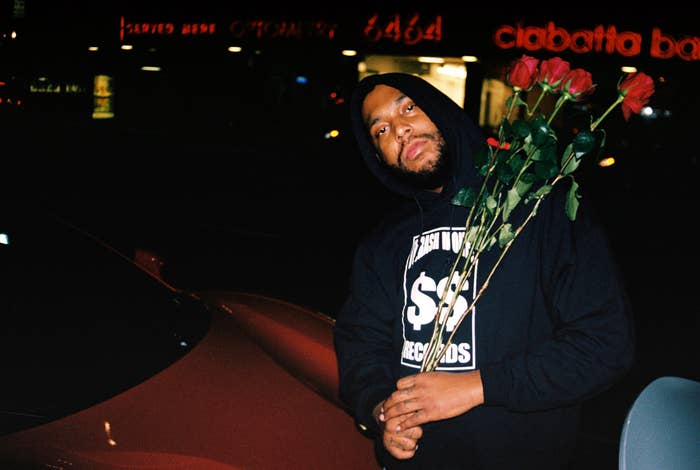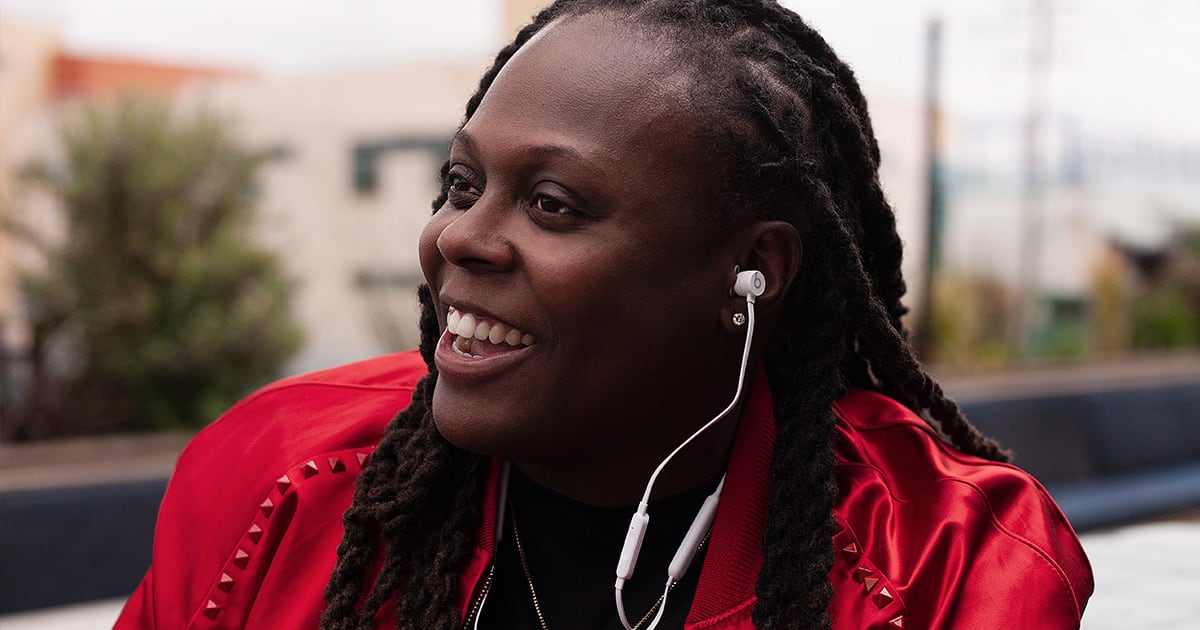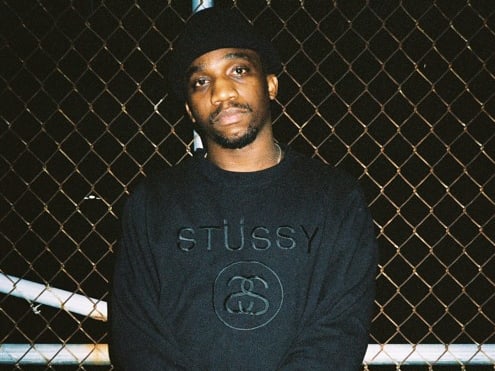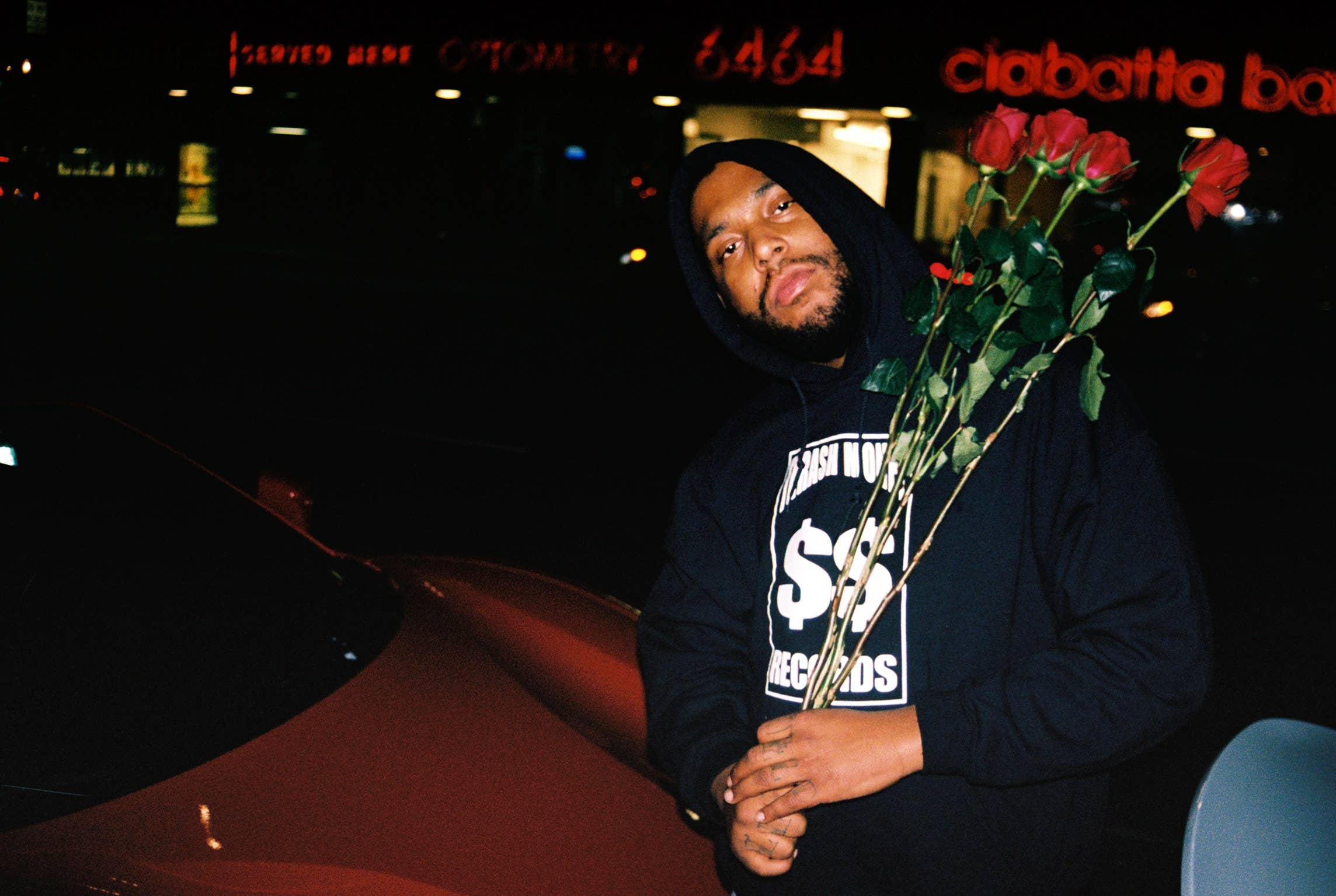
Key’s legacy is imprinted on the sun-soaked city of Atlanta. Since the beginning of his career, the rapper otherwise known as FatManKey has spoken his unapologetic truths and continued to innovate, regardless of outside expectations. Through the years, from his 2012 debut as part of the group Two-9, to his role in the viral hit “Look At Wrist,” all the way up to more recent offerings like Björk-sampling gem “Ice Scream Hello” or the triumphant “Demolition 1+2,” Key has remained dead set on individuality, authenticity, and most notably, growth.
2018 has been a banner year for Key, with his 777 LP, produced entirely by Kenny Beats, serving as a timely reminder that this veteran still has the trailblazing energy of a rookie. The album represents a moment of artistic graduation for an act who is nearly 10 years into his career—three lifetimes and then some for the average rap artist. In this context, Key embodies longevity, and Kenny Beats is the perfect accomplice, a malleable hit-maker whose production provides a seamless platform for Key to share trials, tribulations, and successes.
And yet, even after 15 songs, the story wasn't over. A star-studded deluxe edition of 777 was released Friday, November 30, packing on features from 6LACK, Skepta, Rico Nasty, and Jay Critch—a fitting victory lap for a much lauded project.
“Since he was 17 years old in Atlanta, I think people always knew that there was something different about Key,” Kenny Beats says. “He’s obviously been able to adapt to so many sounds and time periods in his own way, which is clear from the long list of collaborators; but he has always retained an effortlessly weird perspective.”
Since he was 17 years old in Atlanta, I think people always knew that there was something different about Key. - Kenny Beats
“He says things that really make you twist your head or laugh—there isn’t a dull moment,” Kenny adds. “I’ve never seen Key think about how he was going to act on a song. He just is whoever he is that day... authentically. That’s what sets him apart.”
The success of 777 makes now a perfect time to reflect on Key’s long-lasting impact as an often-overlooked underground influencer, but to do so we must go back to 2009. In a landscape of hyper-creativity with a blossoming underground scene, Atlanta was a breeding ground for today’s rap stars.
Cue Key’s first collective act, Two-9: a tight-knit group of unlikely heroes founded by Key, Curtis Williams, and Reese LaFlare. “I met Key back in 2008,” Reese remembers. “Key came up with the name Two-9, I assembled the gang, and we made it into the Two-9 that everybody loves.” It wasn’t until July 2012 that their debut, Two-9 Forever, was released, a compelling introduction that garnered immediate praise from Atlanta and beyond.
Two-9’s debut was charmingly eclectic, paving an unkempt lane and magnifying their musical idiosyncrasies rather than following trends. As a rap group derived from friendship, Two-9’s chemistry and collective spirit was palpable, making them an easy underdog to root for.
While Two-9’s early success proved to be a refreshing look for Atlanta, Key would soon distance himself from the group amid industry interest, explaining in 2015, “The business started changing… I just didn’t want to take that route they were taking.” In 2014, his former group signed to Mike Will Made It’s Ear Drummer Records, but Key remained on undamaged creative terms with Two-9’s members, appearing all over their 2017 major label debut FRVR.
After shifting his focus away from the group, Key established himself as an unmissable voice in the underground with projects like 2012’s Mothers Are The Blame and 2013’s double feature of NOONEISREADY and Fathers Are The Curse. Through it all, the self-proclaimed Martin Luther Key a.k.a Keyoncé refused to stand still, breaking ground with each project.
“He’s a young underground legend. He put on a lot of today’s biggest rappers,” Reese La Flare explains. “If you pay attention to the music you can hear and see Key’s influence [on what’s popular in rap]. The lines between underground and mainstream are very blurred, you know. The big guys look at Key and myself as ahead of the curve, so it’s only right they copy the drip.”
Beyond his own music, Key’s honesty and taste translated to the role of A&R for rap’s new school. Always on the cutting edge, Key was an early supporter of (and collaborator with) Post Malone, Playboi Carti, Bobby Raps, Keith Ape, Father, Makonnen, Raury, and 21 Savage.
Meanwhile, in his own career, Key carved out a spot in underground history with two massively important songs: the OG Maco-assisted “U Guessed It” and “Look at Wrist” with Father and Makonnen. Both tracks impacted the inner-workings of the industry and soon Key ventured into the world of ghostwriting, crafting hits for a colorful array of chart-topping artists—Juicy J being the best-documented example.
Put simply, at the heart of the Atlanta representative’s reputation is a dedication toward evolution, raw and unrestrained. On more recent efforts—Before I Scream, his work on A$AP Mob’s Cozy Tapes, and Two-9’s 2017 album, FRVR, for example—this shines through, as Key continues to break the mold.
While each project been individually appreciated on release, we now have the luxury of looking back and seeing just how influential Key’s work has truly been in the out-turning progression of rap music. For more context and an insider’s view of Key, we spoke to his former manager and the current manager of 21 Savage, Kei Henderson, and close friend and collaborator Jace of Two-9.
If nothing else, this should help assign credit to the quietly influential.

What is your relationship with Key and how did you meet?
Kei: Our relationship started as friends in the Atlanta scene in 2005 when I was throwing parties and he was part of Two-9. Fast forward to 2010; I was about to move to New York, Two-9 had asked me to manage them, and I told them like, “Yo, I'm moving to New York, I don't know if I can help you guys. Just stay in touch, send me music, and I’ll try to help you get posted on Complex.” That’s what I was leaving Atlanta and moving to New York for.
I stayed in touch with him and Curtis Williams back and forth and both of them were just sending me music. Then Key had sent me this one song that was really intriguing—“Guess Who”—and I wanted to help. So I started working with them, and when Key left the group, around 2011-12, I continued to manage him until 2013-14.
Describe Key in three words.
Kei: Sporadic. Genius. Introverted.
Who are a few artists has Key brought to the spotlight and how did these cosigns come together?
Kei: The one that I'm probably closest to is 21 Savage. Key had told me he had this kid that he wanted to sign to the label that he thought was really dope. He started tweeting about him, just putting people into who he was—this is when Savage only had one song called “Picky” that was out on SoundCloud and was doing pretty well on its own. But once Key started tweeting about it and talking about him in different interviews, more people started to gain an interest in him.
I think Key also helped with Makonnen and Father around the same time because the “Look At Wrist” song was already dope as it was, just with Father, but once he put Key and Makonnen on the song, it took off. Plus, Key hopped on that record during a time in his career when he was just on fire. Him being on that record brought a lot of attention. After that, I was working at 10Deep and we booked Father to open up for Makonnen because that song was so on fire. That was a pretty fun moment.
He’s a trendsetter when it comes to music. People think they can copy his style and try to do it better, but he’ll always bounce back with someone new. He’s kinda like a phoenix. - Kei henderson
He also helped introduce us to Post Malone. This was right when I moved to LA in February of 2015. Post Malone was in town and Key told me to pull up to Rex Kudo’s studio. They introduced me to Post Malone, I met him, I heard the song, and the very next day I sent out an email blast to every blog about the record like, “Yo, this kid is going to be the next big thing.” Obviously I wouldn’t have met him had it not been for Key.
Speaking to someone who doesn’t know how influential Key has been in rap, what would you want to make sure they know?
Kei: They should know that Key is a forever evolving being, both musically and sonically. He’s a trendsetter when it comes to music. People think they can copy his style and try to do it better, but he’ll always bounce back with someone new. He’s kinda like a phoenix, you know; you can attempt to burn him but no matter what, he’ll rise from the fire because he’s just that kind of artist.

How did you and Key first meet?
Jace: I originally met Key at this skate shop/sneaker boutique we all used to hang around at. Him and Curtis [Williams] were always up there. They were a little younger than me, but we had mutual friends. Then, after trying to get beats from Curt a few years later, he introduced me to Key.
Around the time that you and Key were both blowing up, there seemed to be a strong sense of community in the Atlanta rap scene between artists and producers alike. How would you describe this sense of community and what was Key’s reputation in the city at the time?
Jace: During the time we were coming up, Key was kind of known as the bridge to a lot of gaps that existed between certain crowds and sounds [in Atlanta] at the time. He knew all the street n****s, the skater n****s, and the music n****s—and not just in an acquaintance kind of way, but on a personal level.
He was cool with Sonny Digital AND Snubnose Frankenstein from way back—both super talented producers with two drastically different sounds production-wise, but he was working with them both and making amazing music. I think that created a sense of creative camaraderie and freedom amongst other artists in the city.
Two-9 is one of the most quietly influential groups to come out of Atlanta in recent years. Can you elaborate on this influence? Was Two-9 trying to do anything innovative or did this all come naturally?
Jace: I definitely see traces of us in a lot of things that are popular today. From certain subject matter and flows to certain stylistic things, the influence is undeniable, in my opinion. But I don’t think we did anything that wasn’t already done. We were influenced by Dungeon Family, Wu Tang, etc. before us, and we just took it a step further. Now, new artists are taking the new step forward.
That said, we didn’t set out to do anything particularly innovative. We were naturally trying to make our mark and leave a lasting imprint on the city and the industry. Do it on out own terms. And hopefully inspire others to do the same.
Key is just a constant innovator. If anyone is "the culture" from a genuine standpoint and not in a cliched sense, it’s him. - jace
Many people credit Key as one of the originators of certain flows and popular styles of rap used in today’s game. How would you describe the influence that he has had on what’s popular in rap?
Jace: His influence is so blatant to me. So undeniable. It’s weird that it doesn’t get acknowledged more. I personally don’t remember anyone saying an "uh" or a little accent ad-lib continuously in-between every bar until he did.
I remember it because when he started doing it, WE HATED IT! Me, Curt, and Johnny said something about it. I think we just thought it was lazy, or that he was dumbing his flow down too much (because this man can really rap like, Black Thought, Lupe Fiasco bar-your-ass-up rap). But Key was like, “Nah, this shit gonna go crazy. Watch.” Then, he ran with it and morphed it and made it amazing. And people were listening. People in ATL. Influential people. Notable people. And then they took off and took it everywhere. Now maybe he wasn’t the first—I’m not sure. Maybe it was others, but I feel like the proof is there. Just listen to his old work. Look at the dates on it and listen to what’s popular now.
I don’t know, maybe I’m tripping. Maybe I’m biased. But I vividly remember when he started using that set up, that cadence and saying, “I’ve never heard this. This is new. This is different.” Now, I hear it everywhere. It’s crazy.
When is all is said and done, how would you describe Key’s legacy in music?
Jace: Key is just a constant innovator. If anyone is “the culture” from a genuine standpoint and not in a cliched sense, it’s him. He made Two-9 up as a high school dropout and had us take over the city. He’s had a link to almost every major artist or movement out of ATL and abroad in the past 10 years. Name anyone popping and I assure you some of what they got going can be traced back to Key, or has traces of him all over it.
He’s your favorite artist’s favorite artist to steal from. People watch who he works with, who he champions as up next and they gravitate towards it. Just look at his track record. He’s been making moves for 10 years. That’s crazy. That’s a legacy.
Speaking to someone who doesn’t know how influential Key has been in rap, what would you want to make sure they know
Jace: I think everyone should know that notoriety and influence are not mutually exclusive. You may not be that familiar with Key or his work or what he’s done. But most of the artists you love know exactly who he is.

